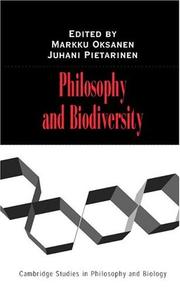| Listing 1 - 5 of 5 |
Sort by
|

ISBN: 0521804302 0521039142 110715880X 9786610702893 0511230753 0511231520 0511316712 0511498527 1280702893 0511229135 0511229976 9780511231520 9780511230752 9780511498527 9780521804301 9780521039147 Year: 2004 Publisher: Cambridge Cambridge University Press
Abstract | Keywords | Export | Availability | Bookmark
 Loading...
Loading...Choose an application
- Reference Manager
- EndNote
- RefWorks (Direct export to RefWorks)
This important collection focuses on the nature and importance of biodiversity. The concept is clarified and its intrinsic and instrumental value are discussed. Even though the term biodiversity was invented in the 1980s to promote the cause of species conservation, discussions on biological diversity go back to Plato. There are many controversies surrounding biodiversity and a few of them are examined here: What is worthy of protection or restoration and what is the acceptable level of costs? Is it permissible to kill sentient animals to promote native populations? Can species be reintroduced if they have disappeared a long time ago? How should the responsibilities for biodiversity be shared? This book will be of interest to philosophers of science and biologists, but also to anyone interested in conservation and the environment.
Biodiversity --- Philosophy --- Arts and Humanities --- Philosophy. --- Biological diversification --- Biological diversity --- Biotic diversity --- Diversification, Biological --- Diversity, Biological --- Biology --- Biocomplexity --- Ecological heterogeneity --- Numbers of species
Book
ISBN: 9780367479596 9780367479589 0367479583 9781000386103 1000386104 9781000386134 1000386139 9780367774974 Year: 2021 Publisher: London Routledge, Taylor & Francis Group
Abstract | Keywords | Export | Availability | Bookmark
 Loading...
Loading...Choose an application
- Reference Manager
- EndNote
- RefWorks (Direct export to RefWorks)
"Rights of nature is an idea that has come of age. In recent years, a diverse range of countries and jurisdictions have adopted these norms, which involve granting legal rights to nature or natural objects, such as rivers, forests, or ecosystems. This book critically examines the idea of natural objects as right-holders, and analyses legal cases, policies, and philosophical issues relating to this development. Drawing on contributions from a range of experts in the field, Rights of Nature: A Re-examination investigates the potential for this innovative idea to revolutionize the concepts of rights, standing, and recognition as traditionally understood in many legal systems. Taking as its starting point Stone's influential 1972 article 'Should Trees Have Standing?', the book examines the progress rights of nature have made since that time, by identifying central themes, unifying principles, and key distinctions in how rights of nature discourse has been operationalized in the disciplines of law, philosophy, and the social sciences. These themes and principles are illustrated through a wide variety of examples, including ecosystem services, indigenous thinking, and ecological restoration, demonstrating how the relationship between humanity and the natural world may be transforming. Taking a philosophical, political, and legal perspective, this book will be of great interest to students and scholars of environmental law and policy, environmental ethics, and philosophy"--
Rights of nature. --- Natural resources --- Nature --- Ressources naturelles --- Law and legislation. --- Droit. --- Nature, Rights of --- Environmental ethics --- Environmental law --- Common heritage of mankind (International law) --- Earth jurisprudence --- Earth laws --- Rights of nature --- Wild law --- Law and legislation --- Philosophy of nature --- Political philosophy. Social philosophy --- Human rights --- Environmental protection. Environmental technology
Book
ISBN: 9781138732582 9780367244637 Year: 2019 Publisher: London Routledge, Taylor & Francis Group
Abstract | Keywords | Export | Availability | Bookmark
 Loading...
Loading...Choose an application
- Reference Manager
- EndNote
- RefWorks (Direct export to RefWorks)
Political philosophy. Social philosophy --- Environmental law
Book
ISBN: 9517546718 9789517546713 Year: 1988 Publisher: [Lieu de publication inconnu]: [éditeur inconnu],
Abstract | Keywords | Export | Availability | Bookmark
 Loading...
Loading...Choose an application
- Reference Manager
- EndNote
- RefWorks (Direct export to RefWorks)
Book

ISBN: 3593448513 Year: 2021 Publisher: Frankfurt/Main Campus Frankfurt / New York
Abstract | Keywords | Export | Availability | Bookmark
 Loading...
Loading...Choose an application
- Reference Manager
- EndNote
- RefWorks (Direct export to RefWorks)
Long description: Eine Million Arten sind in den nächsten Jahren vom Aussterben bedroht. Immer wieder bekräftigen die Vereinten Nationen und Regierungen, die Biodiversität schützen zu wollen. Doch die politischen Ziele werden immer wieder verfehlt. Kann der Schutz der Biodiversität juristisch erzwungen werden? Dazu wurde schon vor Jahrzehnten die Idee eines Klagerechtes für Tiere und Ökosysteme entwickelt. Auch aktuell fordern NGOs und Jurist:innen das Konzept der »Natur als Rechtsperson«. Ist eine solche Weiterentwicklung des Rechts möglich und kann sie Biodiversität schützen? Die Autorinnen und Autoren führen Einsichten aus Ethik, Biologie, den Sozial- und Rechtswissenschaften zusammen: Wie kann man Rechte der Natur begründen? Wie sehen sozialökologische Beispiele aus, in denen Biodiversität und menschliche Ressourcennutzung nicht in Konkurrenz zueinander treten? Was wären die gesellschaftlichen Konsequenzen, wenn Rechte der Natur anerkannt würden? Biographical note: Frank Adloff ist Professor für Soziologe, insbesondere Dynamiken und Regulierung von Wirtschaft und Gesellschaft, an der Universität Hamburg und Co-Direktor der DFG-Kolleg-Forschungsgruppe »Zukünfte der Nachhaltigkeit«. Tanja Busse, Dr. phil., ist Autorin und Moderatorin und Fellow als »Writer in Residence« an der DFG-Kolleg-Forschungsgruppe »Zukünfte der Nachhaltigkeit«.
Nachhaltigkeit --- Globalisierung --- Naturschutz --- Ökologie --- Natur --- Commons --- Umweltsoziologie --- Allmende --- Rechtssystem --- Biodiversität --- Tierethik --- Naturrecht --- Ökosystem --- Tierrecht --- Artensterben --- Naturschutzrecht --- Naturethik --- Artenvielfalt
| Listing 1 - 5 of 5 |
Sort by
|

 Search
Search Feedback
Feedback About UniCat
About UniCat  Help
Help News
News